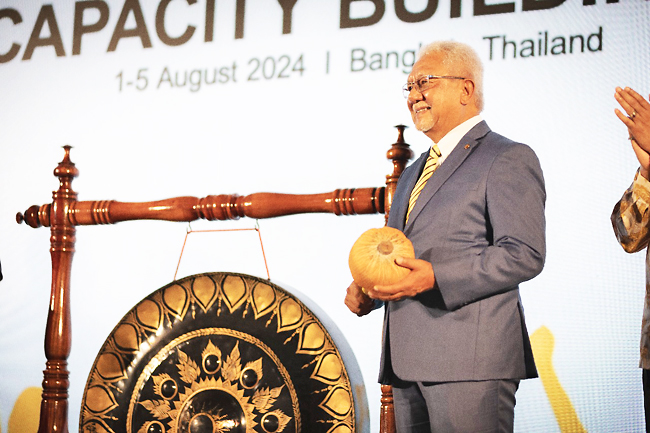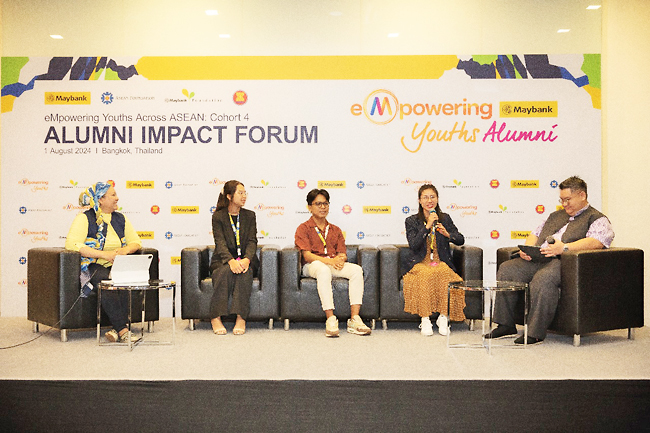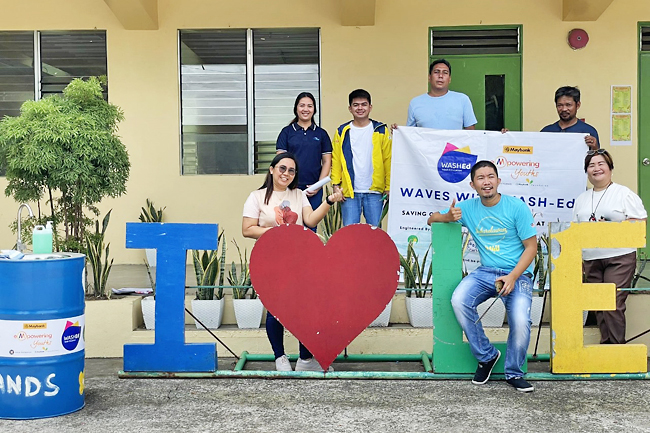In an inspiring gathering at Chulalongkorn University, the first-ever ASEAN Youth Volunteer Alumni Impact Forum brought together alumni from the previous three cohorts of a transformative programme organised by the ASEAN Foundation and sponsored by Maybank Foundation. The event highlighted the significant impact of youth volunteerism across Southeast Asia and the positive changes these young leaders have initiated in their communities.
The forum, part of the programme’s fourth cohort activities, saw the participation of 10 alumni from each of the three previous cohorts, including four from Brunei. This marked a historic moment as it was the first time alumni were formally recognised and brought together to share their experiences and the lasting impact of their work. The forum also provided an opportunity for the current youth volunteers (YVs) to interact with past participants, gaining insights from those who have walked the path of volunteerism and have seen the tangible results of their efforts.
A PLATFORM FOR REFLECTION AND GROWTH
On the first day of the forum, the Alumni Impact Forum offered a platform for alumni to discuss the effects their projects had on their personal and professional lives. The forum featured a panel discussion with key figures, including Maybank Foundation Chief Executive Officer Izlyn Ramli, ASEAN Foundation Executive Director Dr Piti Srisangnam and one alumni representative from each cohort. The discussions not only highlighted the positive outcomes of the programme but also underscored the critical role youth volunteerism plays in fostering ASEAN identity and community development.
Participants in the forum were keen to emphasise the diverse range of projects undertaken across the region, from environmental conservation efforts to educational initiatives and public health campaigns. Among the attendees was Bruneian alumni member Mohammad Asyraaf Iqbal bin Haji Metusin from Cohort 3, who had led a project in the Philippines focused on Water, Sanitation, and Hygiene Education (WASHEd). Reflecting on their time in the Philippines, Mohammad Asyraaf Iqbal shared, “My experience was an incredible opportunity to understand ASEAN better. It allowed me to see that, despite our different backgrounds, we share similar lives and challenges. The project humanised the people in the communities we served, offering a new perspective on the common struggles faced across the region.”




WASHED: EMPOWERING THROUGH EDUCATION
WASHEd, led by Masy Consultants, a youth-led social enterprise in the Philippines, is a flagship initiative aimed at improving water, sanitation, and hygiene standards in schools.
Launched in 2021, the programme addresses the lack of standardised learning curricula and the significant gaps in WASH infrastructure in the country, where 55 per cent of schools have limited or no access to water services, and 37 per cent face similar issues with hygiene facilities.
As a YV, Mohammad Asyraaf Iqbal was deeply involved in the project, which required him and his team to design and implement two key objectives: conducting a community event to raise awareness about WASH and developing ‘Nudge Kits’ to help beneficiaries implement WASH practices. The Nudge Kits, a combination of digital and physical assets, were designed to be distributed among schools and communities, with digital resources hosted online for broader accessibility.
The experience was not without challenges. Mohammad Asyraaf Iqbal, who also served as the group coordinator, had to balance the responsibilities of managing YV welfare in the Philippines, liaising with various stakeholders, and ensuring the successful execution of the project’s objectives. “Leading a group with different backgrounds and skillsets was a challenge, but it taught me patience, understanding, and conflict management. These are invaluable skills that I continue to apply in my work today,” he remarked.
The forum was also a chance for the alumni to reconnect with peers and project partners they had worked with during their volunteer assignments, fostering a sense of camaraderie and shared purpose. For many, it was an emotional reunion, as they revisited the impact they had collectively made during their time in the programme. The sense of unity and shared experience among the alumni was palpable, reinforcing the idea that while the projects may have varied, the underlying goal of fostering understanding and cooperation within ASEAN remained consistent.
PROMOTING LEADERSHIP AND LIFELONG LEARNING
One of the key outcomes of the forum was the emphasis on leadership and the importance of nurturing these skills in youth volunteers.
Mohammad Asyraaf Iqbal, who had taken on leadership roles both in his home country and during his project in the Philippines, spoke about the challenges and lessons learned in managing a diverse team.
“The theme of independence was consistent throughout the project. We were left to our own creativity and ideas when it came to the objectives given, with support from the civil society organisation when needed,” he shared. This autonomy allowed him to develop critical leadership skills, which he believes will benefit him in his future endeavours.
The second day of the forum focused on a series of talks discussing youth volunteerism and ASEAN identity. Participants engaged in dialogues exploring how volunteerism could further strengthen ASEAN’s regional integration and mutual understanding among its member states. The discussions delved into the long-term benefits of volunteerism, not only for the communities served but also for the volunteers themselves, who often emerge from the experience with a greater sense of purpose and a deeper connection to their ASEAN identity.
Additionally, the forum provided a space for current YVs to showcase their ongoing projects and share their aspirations for the future.
The interaction allowed for an exchange of ideas and strategies, as well as the formation of potential collaborations between the alumni and current volunteers. The presence of ASEAN Foundation and Maybank Foundation officials further underscored the importance of these initiatives, offering support and encouragement to the young leaders in attendance.
LOOKING FORWARD
As the forum concluded, there was a strong consensus on the need for a more structured alumni network and regular in-person events to maintain the momentum of the programme. The idea of establishing a formal method of alumni networking was met with enthusiasm, with many participants expressing the eagerness to stay involved and contribute to future projects. The discussions highlighted the importance of sustaining the relationships and networks built during the programme, recognising that these connections are key to the long-term success and impact of the initiatives started by the volunteers.
In addition to networking, the forum also explored the potential for alumni to take on mentorship roles for future cohorts of YVs. The idea was well-received, with many alumni expressing a desire to give back to the programme by guiding new volunteers through their projects, offering advice, and sharing their experiences. Such mentorship could provide support for new YVs, helping them navigate the challenges of their assignments and maximise the impact of their work.
The ASEAN Youth Volunteer programme continues to be a beacon of hope for many young people across the region. By providing funding opportunities for civil society organisations and encouraging youth involvement in volunteerism, the programme not only empowers individuals but also strengthens the social fabric of the ASEAN community. It fosters a generation of young leaders who are not only aware of the challenges faced by their communities but are also equipped with the skills and knowledge to address them.
As this year’s forum came to a close, it was clear that the alumni and current youth volunteers are not only proud of their achievements but are also committed to carrying the spirit of volunteerism forward, ensuring that the impact of their work continues to ripple through their communities and beyond. The future of ASEAN youth volunteerism looks bright, with a growing network of passionate and dedicated individuals ready to make a
difference. – Rizal Faisal






